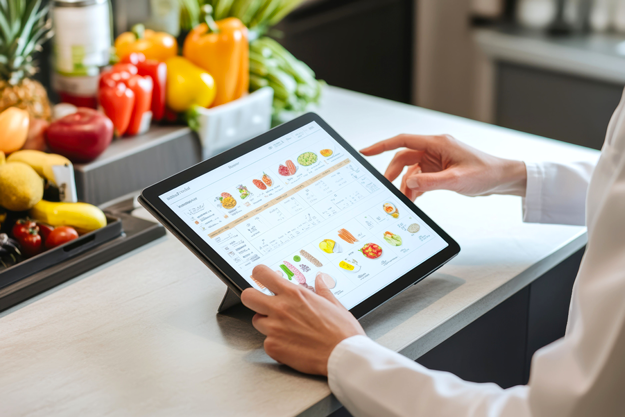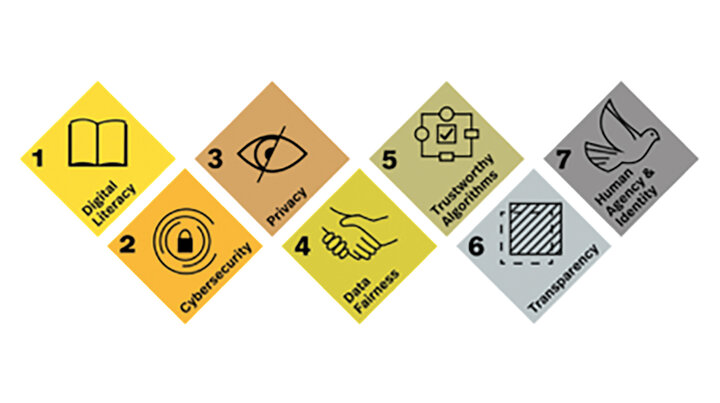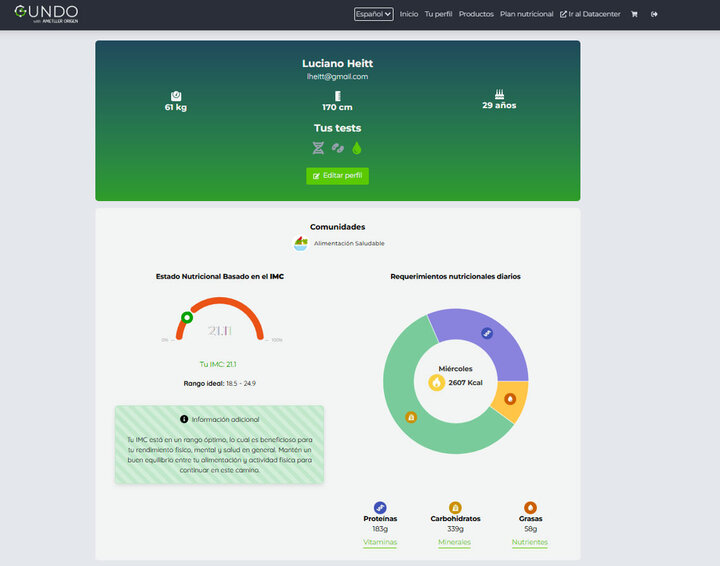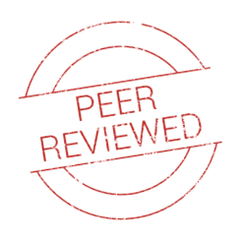Personalized nutrition
Digital solutions in targeted nutrition: integrating technology within food system
Giacomo Sini1* , Ferdinard Ferroli2* , Valeria Poscente3* , Kai Hermsen4 ,
Sara Seweryn5 , Leona Skracic6 , Claudia Zoani7 , Karl Pressen8
*Corresponding authors
1. Project Manager, EUFIC, Belgium
2. Director of Policy & Research, IDENTITY Valley, Germany
3. Research Assistant, ENEA-SSPT-AGROS, Italy
4. Co-Founder, TWINDS foundation, Belgium
5. Research assistant, Premotec GmbH, Switzerland
6. Former Intern, EUFIC, Belgium
7. Researcher, ENEA-SSPT-AGROS, Italy
8. Managing Partner, Premotec GmbH, Switzerland








KEYWORDS
Targeted nutrition
Food choices
Data privacy
Sustainable food systems
Digital responsibility
Abstract
Traditional food-based dietary guidelines offer general advice, but there is a rising demand for tailored recommendations. Studies highlight that personalized nutrition improves dietary behavior and engagement. However, nutrition apps require extensive data sharing, raising privacy concerns. The EU-funded project DRG4FOOD aims to revolutionize nutrition through personalized dietary recommendations, supply chain transparency, and ethical digital solutions. DRG4FOOD aligns with European Digital Rights and Principles to create a trustworthy food system. Through a structured open funding program, the project identified and helped develop and demonstrate a set of solutions to increase transparency in target nutrition as well as other parts of the food chain. By promoting digital responsibility and transparency, DRG4FOOD enhances healthy and sustainable food choices while ensuring consumer trust in data-driven solutions.
Introduction
According to the Food and Agriculture Organization of the United Nations (FAO), food-based dietary guidelines (FBDGs) (1) provide science-based recommendations for healthy eating patterns and represent a reliable source of general dietary advice to meet the nutritional needs of the average person. However, there is a growing demand for specific, tailored advice rather than a “one-size-fits-all” approach which is mostly used in dietary guidelines. Thus, targeted nutrition advice may be the key approach for adopting healthier habits in the long term (2).
Recent studies have shown interest in exploring the impact of tailored nutrition advice on changes in dietary behavior. Personalized nutrition information is more applicable to individual circumstances and is perceived as more valuable (3), which leads to deeper engagement, greater attention, and better retention. Targeted nutrition advice accounts for how different individuals, and even the same individual at different times, respond to diet, considering factors like gender, ethnicity, metabolism, physiology, genetics, and microbiome (4). Individually tailored advice is more effective in encouraging dietary changes, as demonstrated by Zenun Franco et al. (4), who found that after 12 weeks, participants receiving personalized advice showed a greater improvement in diet quality compared to those receiving generalized advice.
The widespread use of mobile phones presents a significant opportunity for targeted nutrition, as nutrition apps are becoming more common and effective, delivering results similar to non-digital approaches. However, to provide tailored advice for each individual, nutrition apps require sharing a lot of personal data, raising concerns about data security and privacy amongst end-users. Along with that, König et al. highlighted that user expressed a preference for apps with recognized branding or labeling, indicating that markers of credibility may be critical for the adoption of nutrition apps (3). Therefore, the need for initiatives that foster trust in data-driven food systems has become more urgent than ever.
The EU-funded DRG4FOOD project (5) is addressing this need by developing a trustworthy, data-driven food system designed to ensure transparency and reliability throughout the entire food chain by testing three use cases, with a particular focus on targeted nutrition, alongside food traceability and consumers’ food choices (DRG4FOOD, 2023).
The DRG4FOOD consortium, along with other experts in the food and technology sector, have defined the term targeted nutrition as:
” Delivering targeted diets and nutrition suggestions by applying a personalized approach towards more healthy diets, even considering personal variables. These variables encompass behavioral and emotional factors linked to food consumption, individual dietary preferences and restrictions, lifestyle, etc. (even in relation, e.g., due to personal beliefs, religious choices, weight management goals, environmental sustainability considerations, etc.)”
The DRG4FOOD consortium aims to set new standards by aligning with European Digital Rights and Principles and the Digital Responsibility Goals (DRGs).

Why is What are the DRGs? Why do we need them?
While the goal of making technology more human-centered is hardly a controversial one, the devil lies in the detail. The growing complexity of digital technologies and sheer limitless variety of possible technical architectures of digital solutions makes a uniform implementation of a “recipe for digital trust” hard to achieve. Not least because requirements for a solution to be deemed trustworthy may differ depending on the context of the data use. Take the data-driven food system: Personal data such as dietary preferences may just be used to suggest recipes. However, this data also contains information to infer health problems.
Hence, making digital technologies more trustworthy comes with costs. Costs in terms of time, resources and sometimes trade-offs in the functionalities of the product. To reduce these costs the DRG4FOOD project is piloting a support system for developing more trustworthy digital solutions based on the DRGs. The DRGs function as a conceptual framework that allows development teams to focus attention on issues critical to the trustworthiness of a digital solution: Digital Literacy, Cybersecurity, Privacy, Data Fairness, Trustworthy Algorithms, Transparency and Human Agency.

Figure 1. The 7 Digital Responsibility Goals (DRGs)
Scientific opportunities and challenges in the personalized nutrition & health field
With the aim to create a blueprint for concrete positive impact in the data-driven food system, the above-mentioned support system is piloted and adapted in cooperation with “real-world” software development teams. A “digital responsibility playbook”, coaching sessions and a responsible technology toolbox enable those teams to make their solutions more human-centered. Further, the co-creation and validation of measurement criteria for digital responsibility together with those teams helps inform a scoring mechanism that could eventually initiate market incentives promoting more human-centered digital technology.
The DRG4FOOD project addresses key challenges in the implementation of personalised nutrition by tackling barriers related to data governance, trust and accessibility. Significant to this approach is the integration of DRGs, which serve as guiding principles to ensure that data-driven innovations respect user privacy, maintain transparency and prioritise ethical standards. Indeed, one of the fundamental issues lies in the sensitive nature of nutritional data, which often includes genetic, behavioural, and health information. Ensuring the secure handling and ethical use of this data is critical to fostering trust among users and stakeholders alike.
Hence, central to the DRG4FOOD strategy is the structured program to fund innovative solutions through Open Calls, encouraging the development of cutting-edge methodologies and tools that meet the ethical and functional standards set by the DRGs, while also promoting interoperability and inclusivity. Applicants to these programs are evaluated not only on technical feasibility but also on their ability to address critical issues such as accessibility, data sovereignty, and environmental impact.
Moreover, a further demonstration of DRG4FOOD’s commitment to accessibility and public engagement is the development of a comic book as an educational and communication tool. To bridge the gap between complex scientific concepts and public understanding, this resource simplifies key aspects of the DRGs, data governance, and personalised nutrition, making them accessible to a wide range of audiences, including younger generations and non-experts. By demystifying technical topics, the comic book fosters greater awareness and acceptance of the ethical and technological advancements driven by the project. Such efforts highlight the importance of transparent and relatable communication in building a supportive ecosystem for personalised nutrition.
The future
Click to edit...
The DRG4FOOD’s pilot projects implementing the DRGs
The Open Calls program within DRG4FOOD has successfully attracted a various array of innovative projects aimed at advancing personalised nutrition, with a particular emphasis on creating tailored solutions that address both individual health and environmental sustainability. These initiatives leverage cutting-edge technologies, including artificial intelligence and machine learning, to provide personalised dietary recommendations based on a comprehensive analysis of individual health data, lifestyle factors, and environmental considerations. Furthermore, these projects are designed with rigorous data privacy and security standards in mind to ensure the trust and safety of users.
A notable example from the DRG4FOOD initiative is the GENIE project (6), which pioneers an ultra-personalized nutrition recommendation system. By integrating genetics, gut microbiota, and biochemical blood test data with consumer preferences, GENIE leverages artificial intelligence and advanced data platforms to offer tailored dietary advice. This system not only enhances individual health outcomes but also simplifies the decision-making process for consumers by embedding scientifically backed recommendations directly into their shopping experiences. The project's potential for public health impact is amplified through its scalability, enabling rapid adoption across markets in Europe and Latin America with Ametller Origen.

Figure 2. Ametller Origin dashboard
Another DRG4FOOD initiative driving advancement in this domain is the NutriWell project (7), an advanced, technology-integrated platform designed to redefine personalized nutrition. By combining advanced health analytics with social engagement, NutriWell provides a precise and adaptable dietary planning solution tailored to individual nutritional requirements, health goals, and culinary preferences. Its unique features, such as cuisine-switching capabilities and an embedded social networking component, enhance user engagement, promote adherence and long-term behavioral change. Additionally, the platform leverages the innovative Nutrition Data Space, ensuring a highly personalized and flexible approach to dietary recommendations with actionable insights.
In addition, PINACLE(8) addresses the growing need for personalised dietary recommendations in food security contexts. This project focuses on matching food donations with recipients’ specific dietary needs, using advanced algorithms to ensure that healthier, more nutritionally appropriate foods reach those in need. PINACLE enhances food security by promoting better health outcomes through tailored dietary interventions.
Other impactful projects include SafeNutriKids (9), which promotes healthier dietary habits and digital literacy among children through a personalised nutrition app. The app helps children overcome challenges such as stress-induced eating or lack of motivation, providing a more holistic approach to improving children's nutrition and overall well-being. Additionally, NutriSight (10) simplifies nutritional information by extracting data from food packaging, making it easier for users to make healthier food choices. This project fosters a more transparent and trustworthy food ecosystem by leveraging technology and ethical practices to empower consumers.
Together, these five out of eight projects highlight a multi-dimensional strategy for personalized nutrition. Along with these projects, ATTESTED (11) and CACAO-TECH (12) ensure transparency in the food supply chain.
This combination of targeted nutrition, traceability, and user engagement provides a comprehensive path toward healthier and more sustainable dietary practices. It also demonstrates that data-based approaches to the food system come in various shapes and sizes, demanding a multi-faceted approach, that should be based on stakeholder-engagement, openness, interoperability and responsibly handling data while applying to specific and well-defined use cases, paving the way for a resilient and trustworthy digital food ecosystem.
Conclusion
The DRG4FOOD project is at the forefront of transforming the food system through a data-driven, responsible, and human-centered approach. By fostering the development of digital solutions that align with European Digital Rights and Principles, DRG4FOOD ensures that targeted nutrition is not only personalized but also transparent, ethical, and trustworthy. Through the pilot projects initiatives, the project showcases how tailored dietary recommendations, supply chain transparency, and user engagement can work together to promote healthier and more sustainable food choices.
However, ensuring that all stakeholders—from consumers to developers and policymakers—understand the significance of the DRGs in the food sector requires effective communication. To address this need, a comic book (13) that illustrates the importance of DRGs in the food system for different target audiences has been developed. This engaging format helps communicate complex concepts in an accessible way, reaching diverse audiences and fostering awareness about the role of digital responsibility in the food system.
By integrating innovative digital solutions with strong ethical frameworks and clear communication strategies, DRG4FOOD is paving the way for a more transparent, secure, and user-centric future in food and nutrition.
References and notes
- https://www.fao.org/nutrition/education/food-based-dietary-guidelines – Accessed on 8th August,2024
- Jinnette, R., Narita, A., Manning, B., McNaughton, S. A., Mathers, J. C., & Livingstone, K. M.. Does Personalized Nutrition Advice Improve Dietary Intake in Healthy Adults? A Systematic Review of Randomized Controlled Trials. Advances in nutrition (Bethesda, Md.), 12(3), 657–669, 2021. https://doi.org/10.2196/29088
- König, L. M., Attig, C., Franke, T., & Renner, B. (2021). Barriers to and Facilitators for Using Nutrition Apps: Systematic Review and Conceptual Framework. JMIR mHealth and uHealth, 9(6), e20037. Advance online publication. https://doi.org/10.2196/20037
- Zenun Franco, R., Fallaize, R., Weech, M., Hwang, F., & Lovegrove, J. A. Effectiveness of Web-Based Personalized Nutrition Advice for Adults Using the eNutri Web App: Evidence From the EatWellUK Randomized Controlled Trial. Journal of medical Internet research, 24(4), e29088, 2022. https://doi.org/10.2196/29088
- https://drg4food.eu/- Accessed on 28th August,2024
- GENIE: drg4food
- NUTRIWELL: drg4food
- PINACLE: drg4food
- SafeNutriKids: drg4food
- NUTRISIGHT: drg4food
- ATTESTED: https://drg4food.eu/meet-the-winners-attested/
- CACAO – TECH: drg4food
- Comic book: https://drg4food.eu/comic-book/



